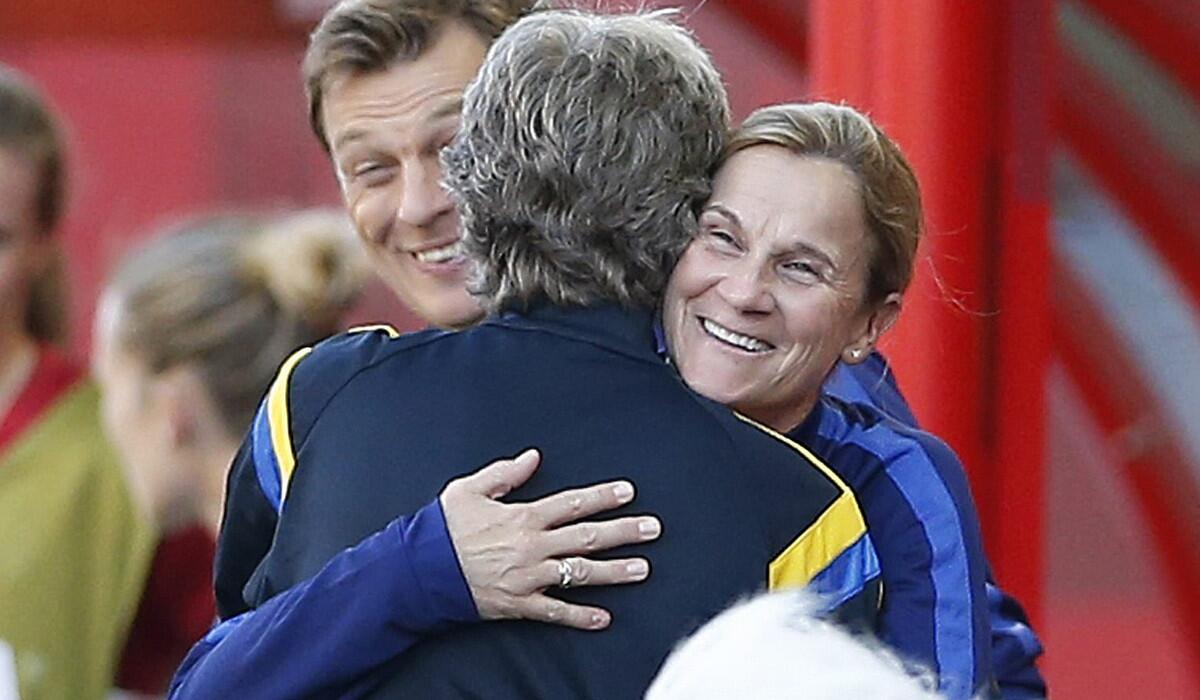Women’s World Cup: Reactions vary to former U.S. coach’s criticisms

U.S. Coach Jill Ellis, right, and Sweden Coach Pia Sundhage embrace prior to their teams’ World Cup match Friday in Winnipeg.
VANCOUVER, Canada — Former U.S. Coach Pia Sundhage had some rough words for some of her old players before her current team, Sweden, played her old one to scoreless draw in a World Cup match Friday.
But much of that appeared to be forgotten by the time the game ended in a scoreless draw, with Sundhage and U.S. Coach Jill Ellis wrapping one another in a warm hug on the sidelines.
“Pia’s got extraordinary character and I love hanging out with her,” said Ellis, Sundhage’s assistant during her days with the U.S. national team. “We’ll be friends for a long, long time.”
One person who wasn’t smiling, though, was midfielder Carli Lloyd. Sundhage said Lloyd, who twice scored the winning goal in an Olympic final, would wilt on the field if she felt the coaches had lost faith in her.
“I’m not hurt or bothered by what anyone says. But I was a bit more confused,” she told reporters after Friday’s game. “I’ve done nothing but respect Pia until the day she left. In 2008 she showed faith in me and I helped her win. In 2012 she had no faith in me and I still helped her win.”
Lloyd was benched for the opening game of the 2012 London Olympics, but started the next five, scoring twice in the final.
“I don’t change my game plan for any coach,” Lloyd continued. “Whether the coach likes me or not, I still bring 100%.”
Judgment call
Several teams have complained about inconsistent officiating in this World Cup. And much of that probably stems from FIFA’s attempt at inclusion, which has meant using referees from countries where the women’s game is still developing.
Mexico, for example, had to settle for a draw in its first match with Colombia last week after referee Therese Neguel of Cameroon waved off a late goal by Charlyn Corral that video replays showed should have counted.
Neguel, officiating her first World Cup game, relied on the first use of goal-line technology in a women’s World Cup to award Mexico’s goal in that same game.
“I got the impression that we have a group of referees that are not familiar with the level of the competition, with the scenario, with the type of game that they are going to face,” Mexican Coach Leonardo Cuellar said. “On one play, they changed three times their decision. It was always on the edge.”
Coaches were told before the tournament to be tolerant of referees’ mistakes. But Cuellar said there is a noticeable difference in the quality of officiating for his team’s games and games played by Germany or Canada, whose second match drew highly respected referee Bibiana Steinhaus, the first female to call men’s professional games in Germany.
“They’re not petrified or wondering what they’re going to call,” said Cuellar, whose team is unlikely to advance after losing to England on Saturday. “I might get reprimanded for my comments, but teams work very hard to qualify and teams work very hard to be prepared and they want to be on even ground.”
Fox draws record audience
Fox’s coverage of the U.S.-Sweden game on Friday averaged 4.5 million views, the largest U.S. television audience ever for a group-stage match and the fourth-largest for any women’s World Cup game.
The network said Saturday that the only women’s World Cup matches to draw larger audiences were the 1999 and 2011 finals and a 1999 semifinal.







